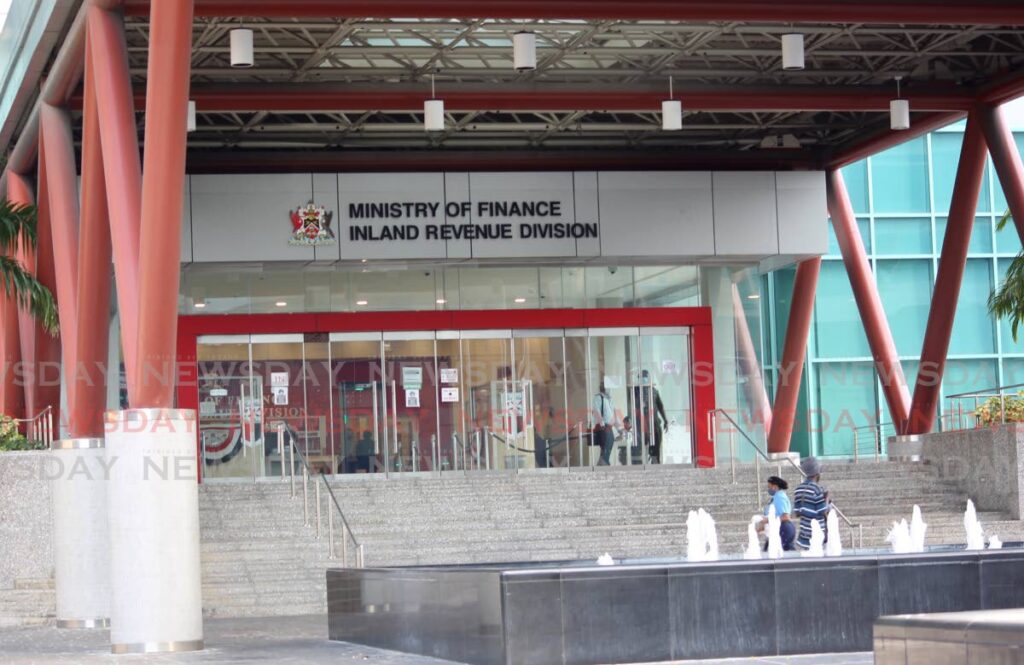 The Inland Revenue Division of the Ministry of Finance in Port of Spain. - File photo by Roger Jacob
The Inland Revenue Division of the Ministry of Finance in Port of Spain. - File photo by Roger JacobWHILE some people say the process of paying the property tax was smooth and the cost reasonable, others are hoping for an extension as they complained of confusion over queries.
The deadline for payment of the property tax is September 30.
On September 9, Newsday went to Government Plaza on Wrightson Road, where several people had issues, including mix-ups in valuation forms and querying the values of their properties.
Inside, people were going to pay property tax and run other errands, including payments for ID cards, CXC exams, etc.
No one was lined up outside the building but some people – fewer than ten – were being ushered through security checks to go to their respective departments.
“To pay it is easy, but if you are making a query, it is disorganised,” said one elderly woman from Maraval, who did not want to be named.
She said she was querying her valuation, which was more than $2,000.
“The value of the property was too high,” she said.
“I queried it the first time they sent the valuation. They said if I object, I have to go to the Valuation Division in Barataria. I am not satisfied with the amount, but they said you have to pay, so I went to pay and then query after because I don’t want them to add no tax.”
One woman from Diego Martin said she had not gotten her valuation form.
“I don’t know anything about it,” said Corinne Gomez. “I hope they give an extension.”
A Venezuelan who went to pay on behalf of two other people said she had heard about the confusion over the radio. She had an issue with getting information on the value of her property.
“I heard this morning people were not getting their papers,” she said.
“I went to TTPost to get the notice. I got the first letter, but I didn’t get the valuation. They sent me to Barataria. In Barataria, they told me verbally what I had to pay.”
Traci-Ann Nichols said the process was smooth but she did not get to pay because she had two forms with two different PINs and two different values for her Diego Martin property.
“When they did the assessment (of the value of her property), that piece of paper was carrying one PIN, and what they sent for me with the value, with the yearly instalments, it was carrying a different PIN. They had different prices: one was carrying more than $900 and the other was carrying over $400. Same name, different PINs, different price.”
She was told to go to the Valuation Division in Barataria, like many others.
“It could be a mix-up, I don’t know, but I am going up there,” she said.
At the Board of Inland Revenue office on Cipero Street, San Fernando, Newsday reporters saw about 30 people lined up outside the office building. They said they had been lined up for about half an hour.
Herman Constance from Aranguez spoke to Newsday at Government Plaza, saying he had paid his property tax and was helping two other people pay theirs.
“I would pay taxes quarterly, so I understand the process,” he said.
“A couple of my clients put me on to some people who wanted to pay their property tax so they will give me the relevant documents and I will help them.”
He said the process was straightforward and he had no objection to the amount.
“For me, it wasn’t even $600, and that was for the whole year,” he said.
Virginia Miguel from Valencia said she had no problems with paying the tax.
“All over the world, you have to pay tax on everything,” she said.
“If the country has to run, it must run on something. When you go abroad and you see the quality of life people live over there, it is because they pay taxes.
“I felt good about paying it. I felt it was reasonable.”
About the tax
Property tax, in its earlier incarnation as land and building tax, has a long history in TT, being a feature of colonial and post-independence revenue collection as a source of funding for local government.
It served as a significant resource in the 1970s during TT's first oil boom.
In 2009, the People's National Movement (PNM) introduced and passed the Property Tax Act but in 2010, the opposition launched a campaign against it, the popular Axe the Tax campaign, started by the Congress of the People (COP) and then taken up by the United National Congress (UNC) during their tenure from 2010-2015.
When the PNM returned to office, it announced plans to introduce a revised property tax based on updated property valuations. Its attempts in 2018 were met with public resistance and legal challenges.
Finance Minister Colm Imbert announced plans in 2021 to begin collecting the tax the next year, noting that the last valuation of properties was in 1948.
He said property owners had been paying far less than the appropriate amount.
The property tax is calculated at two per cent of the annual rental value of the property, amended from three per cent on March 15. The valuation is based on the classification of land, whether agricultural, residential, commercial or industrial, the classification of the building, the dimensions and modifications.

 6 months ago
90
6 months ago
90
 English (US) ·
English (US) ·